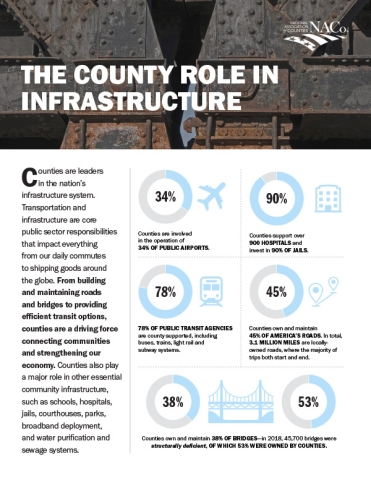2020 NACo Advocacy Center
Upcoming Events
Related News
Take Action Today!
|
https://player.vimeo.com/video/453674581 Watch the Advocacy Toolkit introduction video |
To help local leaders advocate for top county priorities between now and the end of the year, NACo has developed an online Advocacy Toolkit, which features in-depth information, talking points, sample advocacy emails, tweets and Facebook posts, federal legislation trackers and exclusive NACo materials to help tell the county story.
As members of Congress are in their home districts, this toolkit provides resources to communicate with them, demonstrate the impact of county programs and advocate for federal policies that support local priorities.

|
Provide Direct, Flexible Coronavirus Aid to County Governments of All Sizes |
Learn More |
 |
Amend the Federal Medicaid Inmate Exclusion Policy |
Learn More |

|
Promote County Infrastructure Priorities |
Learn More |
 |
Support Mandatory Funding for Payments in Lieu of Taxes and Reauthorization of Secure Rural Schools |
Learn More |

|
Restore the Balance of Federalism and Optimize Intergovernmental Partnerships |
Learn More |
 |
Strengthen Election Integrity and Security |
Learn More |
| Video Background |
Provide Direct, Flexible Funding to County Governments Of All Sizes
Urge your member of Congress to support legislation that provides direct, flexible funding to counties of all sizes.
| Background |
BACKGROUND
Prior to adjourning for August recess, Congressional leaders and the administration failed to reach an agreement on a fifth COVID-19 relief package. Four relief packages had previously been enacted in response to the economic fallout from the COVID-19 pandemic, with the latest relief package signed into law on April 23. Talks for a fifth relief package fell short as negotiators were unable to reach a compromise between the House’s “HEROES Act” and the Senate and Trump Administration’s “HEALS Act.” Throughout negotiations, counties urged federal leaders to work together and provide county governments with direct and flexible funding to counties of all sizes to further assist in mitigating the virus, protect the public’s health and restore the economy. For more information, visit NACo’s COVID-19 Pandemic Federal Policy News & Resources webpage. COUNTY INTERESTAs the COVID-19 pandemic continues, county governments and our residents are faced with devastating health and economic impacts. Counties remain on the frontlines of our nation’s ongoing local public health emergency response and overall public safety efforts. Led by 40,000 elected county officials and a workforce of 3.6 million public servants, America’s 3,069 counties support over 1,900 local public health departments, nearly 1,000 public hospitals and critical access clinics, more than 800 long-term care facilities and 750 behavioral health centers. As counties respond to the current health crisis, the COVID-19 pandemic could lead to massive budgetary impacts for county governments and local taxpayers, with as much as $202 billion in lost revenue and increased expenditures through FY2021. Due to a drastic decrease in revenue, counties will continue to see a decline in local government jobs, impacting county run services. As of March 2020, local governments saw a decrease of 2.1 million jobs. |
||||||||||||||||||||||||||||||||||||||||||||||||||||||||||||||||||||||||
| Take Action |
TALKING POINTS
TWEETSPOST ON FACEBOOKClick here to post about this issue on Facebook. EMAIL YOUR MEMBERS OF CONGRESSNACo has created an email template to get you started. Click here to download and use the links below to find your members. FIND YOUR MEMBERS OF CONGRESS |
||||||||||||||||||||||||||||||||||||||||||||||||||||||||||||||||||||||||
| Legislative Activity |
|
| https://player.vimeo.com/external/447866012.hd.mp4?s=7c2117758c4b3d4bf7a91daa064bcb8b87eb444e&profile_id=174 |
Amend the Federal Medicaid Exclusion Policy
Urge your member of Congress to amend the Medicaid inmate exclusion policy.
| Background |
BACKGROUNDCurrent federal law prohibits the use of federal funds and services, such as Medicaid and the Children’s Health Insurance Program (CHIP), for health care provided to inmates of a public institution – a category that includes our local jails. The policy, known as the Medicaid inmate exclusion policy (MIEP), was originally enacted in 1965 under the Social Security Act and intended to prevent state governments from shifting inmate care costs to federal programs. However, this practice has had an unintended consequence of cutting off federal health benefits to local jail inmates who are awaiting trial and presumed innocent Click here to view a policy brief for more information. COUNTY INTERESTCounties own and operate 91 percent, or 3,100, of local jails across the country, which see approximately 10.6 million individuals pass through each year, with an average length of stay of 25 days. Although two-thirds of those detainees are pre-trial and presumed innocent, current federal law prohibits Medicaid and other federal safety net programs from paying for their medical care, leaving counties responsible for the full cost of inmates’ health care, rather than the traditional federal, state and local partnership for safety-net services. NACo has created a toolkit and drafted a comprehensive report detailing the impact of this policy on county jails, inmates, and local communities, with relevant policy recommendations. |
||||||||||||||||||||||||||||||||||||||||||
| Take Action |
TALKING POINTS
TWEETPOST ON FACEBOOKClick here to post about this issue on Facebook. EMAIL YOUR MEMBERS OF CONGRESSNACo has created an email template to get you started. Click here to download and use the links below to find your committee members. FIND YOUR MEMBERS OF CONGRESSRelevant Committees with Jurisdiction (Find Your Member): |
||||||||||||||||||||||||||||||||||||||||||
| Legislative Activity |
|
| https://player.vimeo.com/external/447866012.hd.mp4?s=7c2117758c4b3d4bf7a91daa064bcb8b87eb444e&profile_id=174 |
Promote County Infrastructure Priorities
 |
Surface Transportation Reauthorization |
Learn More |

|
Water Resources Development Act (WRDA) |
Learn More |
 |
Broadband Infrastructure |
Learn More |
Surface Transportation Reauthorization
Urge your members of Congress to support county priorities in any new infrastructure package.
| Background |
BACKGROUND
Congress is working towards a long-term surface transportation reauthorization, as the current law – the Fixing America’s Surface Transportation Act (P.L. 114-94/FAST Act) – expired on September 30, 2021. This historically bipartisan bill includes significant policy and funding provisions to improve and enhance the nation’s transportation systems. Including highway and bridge construction and maintenance, highway and motor vehicle safety, public transportation, rail, hazardous materials safety and research, technology and statistics program. To learn more about county transportation infrastructure priorities, click here. COUNTY INTERESTCounties play a critical role in the nation’s transportation system, owning 45 percent of all public roads and building and maintaining 38 percent of the National Bridge Inventory. Counties operate 78 percent of all public transit agencies and 34 percent of public airports that connect residents, communities and businesses with the global economy. |
||||||||||||||||||||||||||||||||
| Take Action |
TALKING POINTS
TWEETPOST ON FACEBOOKClick here to post about this issue on Facebook. EMAIL YOUR MEMBERS OF CONGRESSNACo has created an email template to get you started. Click here to download and use the links below to find your committee members. FIND YOUR MEMBERS OF CONGRESSRelevant Committees with Jurisdiction (Find Your Member):
|
||||||||||||||||||||||||||||||||
| Legislative Status |
|
Water Resources Development Act (WRDA)
Urge your member of Congress to support county priorities in the Water Resources Development Act.
| Background |
BACKGROUNDCongress is working towards a two-year Water Resources Development Act (WRDA) reauthorization bill, as the current law – the America’s Water Infrastructure Act of 2018 (P.L. 115-270) – expired on September 30, 2020. WRDA bills authorize water resources studies and projects and set policies for navigation, flood control, hydropower, recreation, water supply and emergency management for the U.S Army Corps of Engineers. This legislation is usually passed on a biennial basis and addresses county interests related to ports, inland waterways, levees, dams, wetlands, watersheds and coastal restoration. Counties often partner with the Army Corps to strengthen local infrastructure. To learn more about county water infrastructure priorities, click here. COUNTY INTERESTAs major owners, users and regulators of water resources and systems with the responsibility for funding 95 percent of all local public water infrastructure needs, counties and other local governments are directly impacted by the policies and funding authorized under WRDA. Counties invest $134 billion annually in the construction of infrastructure and the maintenance and operation of public works, including public water systems and water infrastructure projects. |
||||||||||||||||||||||||||||||||||||||||
| Take Action |
TALKING POINTSCounties are major owners, users and regulators of water resources and systems with the responsibility for funding 95 percent of all local public water infrastructure needs Any WRDA legislation should include the following county priorities
TWEETPOST ON FACEBOOKClick here to post about this issue on Facebook. EMAIL YOUR MEMBERS OF CONGRESSNACo has created an email template to get you started. Click here to download and use the links below to find your committee members. FIND YOUR MEMBERS OF CONGRESSRelevant Committees with Jurisdiction (Find Your Member): |
||||||||||||||||||||||||||||||||||||||||
| Legislative Status |
|
Broadband Infrastructure
Boost Advanced Broadband Deployment and Accessibility While Preserving Local Decision-Making.
| Background |
BACKGROUND
In response to the COVID-19 pandemic, now more than ever, Americans are relying on dependable, high-speed internet to perform their job or attend school in a virtual setting. Counties are strongly committed in advancing broadband deployment and accessibility while preserving local decision-making. However, there are federal and state efforts to prevent local governments from serving as effective stewards of public property, safety, and welfare. In 2019, the Federal Communications Commission (FCC) imposed regulations restricting local authority in the deployment of 5G wireless networks, putting public health and safety at risk. Specifically, the FCC order constrains local governments to a narrow application approval timeline – effectively preventing local governments from conducting necessary procedures such as providing open public comment periods as well as historical preservation and environmental reviews. Concurrently, county governments in 22 states are restricted from making critical investments in local broadband networks due to state-imposed bans and restrictions. These barriers are preventing local governments from effectively and efficiently addressing the challenges of this public health pandemic and looming economic crisis. NACo supports the Accelerating Broadband Development by Empowering Local Communties Act of 2019 (H.R. 530 / S. 2012) and the Community Broadband Act (H.R. 2785 / S. 3649) which would remove these barriers and empower communities to provide connectivity solutions during this critical time. COUNTY INTERESTConnectivity issues continue to plague counties across the United States. Approximately 19 million Americans lack access to even basic broadband services. Connectivity is imperative for economic competitiveness in the 21st century. From e-commerce and the gig economy to distance learning and tele-health facilities — county residents’ daily lives are increasingly reliant on a certain level of connectivity. Counties must fulfill our responsibilities as trustees of public property and as protectors of public safety and health during the deployment process. |
||||||||||||||||||||||||||||||||
| Take Action |
TALKING POINTS
TWEETPOST ON FACEBOOKClick here to post about this issue on Facebook. EMAIL YOUR MEMBERS OF CONGRESSNACo has created an email template to get you started. Click here to download and use the links below to find your committee members. FIND YOUR MEMBERS OF CONGRESSRelevant Committees with Jurisdiction (Find Your Member): |
||||||||||||||||||||||||||||||||
| Legislative Status |
|
| https://player.vimeo.com/external/447866012.hd.mp4?s=7c2117758c4b3d4bf7a91daa064bcb8b87eb444e&profile_id=174 |
Support Full Mandatory Funding for Payments In Lieu of Taxes (PILT) and the Secure Rural Schools (SRS) Program
Urge your member of Congress to support full mandatory funding for PILT and SRS
| Background |
Background
NACo supports restoring full mandatory funding for the Payments in Lieu of Taxes (PILT) program, which compensates public lands counties for untaxable federal land. NACo also supports extending the Secure Rural Schools (SRS) program as a transitional funding mechanism until the federal government fully implements a sustainable, long-term forest management program with adequate revenue sharing for forest counties and schools. County InterestOver 1,900 counties (61.6 percent) in 49 state states, the District of Columbia, Puerto Rico and the U.S. Virgin Islands benefit from PILT and SRS. These counties rely on PILT and SRS to support critical county services, including law enforcement, search and rescue, fire protection, forest maintenance, education and transportation infrastructure. |
||||||||||||||||||||||||||||||||||||||||||||||||
| Take Action |
TALKING POINTsPayments in Lieu of Taxes
Secure Rural Schools
TWEETPOST ON FACEBOOKClick here to post about PILT on Facebook. Click here to post about SRS. EMAIL YOUR MEMBERS OF CONGRESSNACo has created an email template to get you started. Click here to download and use the links below to find your committee members. FIND YOUR MEMBERS OF CONGRESSRelevant Committees with Jurisdiction (Find Your Member): |
||||||||||||||||||||||||||||||||||||||||||||||||
| Legislative Activity |
|
Restore the Balance of Federalism and Optimize Intergovernmental Partnerships
Urge your members of Congress to support the Restore the Partnership Act (H.R. 3883).
| Backgroud |
Background
NACo supports efforts that recognize and respect the unique roles and responsibilities of counties as essential partners — not just stakeholder — in our nation’s intergovernmental system of federal, state, local and tribal government officials. Consistent and meaningful engagement and consultation between intergovernmental partners is vital in the development and implementation of effective policies, programs and regulations. NACo urges Congress to pass the Restore the Partnership Act (H.R. 3883 / S. 2967) and the Unfunded Mandates Information and Transparency Act (H.R. 300 / S. 3689) to increase transparency to reduce regulatory burden, foster intergovernmental dialogue and unite all levels of government in supporting our unparalleled system of federalism. For more information, click here. County InterestCounties are responsible for a wide range of issues, including public infrastructure, transportation, healthcare, economic development, criminal justice and law enforcement, and many others. While some of these responsibilities are unique to counties, in many cases we work with our state and federal partners to achieve optimal solutions. We often serve as co-regulators with our state and federal counterparts. While policies and programs established by the federal government are intended to guide and coordinate efforts, they are ultimately implemented and enforced at the state and local levels. When the cost of unfunded mandates outweighs available funds at the local level, counties often have to make difficult budget choices on services needed in their communities. |
||||||||||||||||||||||||||||
| Take Action |
Talking Points
TweetPost on FacebookClick here to post about this issue on Facebook. Email Your Members of CongressNACo has created an email template to get you started. Click here to download and use the links below to find your committee members. Find Your Members of CongressRelevant Committees with Jurisdiction (Find Your Member): |
||||||||||||||||||||||||||||
| Legislative Status |
|
| Video Background |
Strengthen Election Integrity and Safety
Urge your member of Congress to support legislation that that provides consistent, predictable and dedicated federal resources to help counties administer fair and secure elections.
| Background |
BACKGROUNDThe COVID-19 pandemic has fundamentally altered the landscape of the 2020 election cycle. America’s counties traditionally administer and fund elections at the local level, overseeing more than 109,000 polling places and coordinating more than 694,000 poll workers every two years. Beyond these traditional requirements, counties are now grappling with even more costly election-related challenges from providing additional voting options, keeping polling locations clean and complying with social distancing mandates. NACo supports federal policies that provide flexibility for local decision making and increased federal investments in the nation’s elections system. Furthermore, NACo supports a consistent, predictable and dedicated federal funding stream to assist counties with meeting the significant federal requirements already imposed on local governments administering elections and additional federal resources to meet current challenges local elections officials face due to COVID-19. We also support efforts by Congress and the administration to combat cybersecurity threats in a way that is inclusive of county election and technology officials. For more information, click here. COUNTY INTERESTAdministering and financing elections is an essential role and major responsibility for counties nationwide. Between the 2016 and 2018 general elections, county jurisdictions process over 73 million registration forms. In the 2018 general elections, more than 109 million voters, or almost 91 percent of voters nationwide, cast their ballots with jurisdictions where counties administer and coordinate elections. Along with administering elections, county officials work tirelessly to preserve the integrity and security of America’s elections. Local governments protect against hacks to voter rolls to alter data and attempts to remove election information from county websites. Counties hire and train poll workers to ensure they are well equipped to assist voters and protect against voter fraud or other security risks. Additionally, election officials are prepared for a wide range of “hard security” challenges at polling locations, including mitigating natural disasters, following protocols for an active shooter or fire and other emergencies. Voter fraud in America is essentially non-existent due in large part to the efforts and actions taken by county election officials every single day. |
||||||||||||||||
| Take Action |
TALKING POINTs
TWEETPOST ON FACEBOOKClick here to post about this issue on Facebook. EMAIL YOUR MEMBERS OF CONGRESSNACo has created an email template to get you started. Click here to download and use the links below to find your committee members. FIND YOUR MEMBERS OF CONGRESSRelevant Committees with Jurisdiction (Find Your Member): |
||||||||||||||||
| Legislative Activity |
|
Additional Resources: July Federal Policy Update
https://player.vimeo.com/video/447144740

